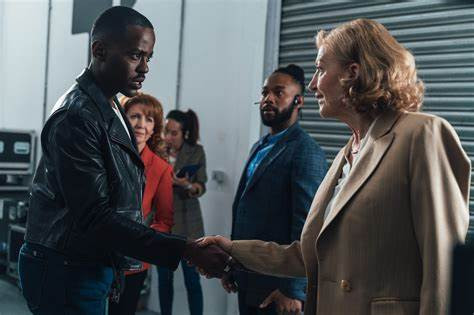The latest installment of Doctor Who, titled “Ruby Sunday,” marks the beginning of what should be a thrilling season finale. However, this episode, while intriguing, feels more like a setup than a satisfying chapter in itself. It teases with suspense and raises numerous questions, but it also highlights some of the recurring weaknesses present throughout this season, leaving us somewhat underwhelmed and hoping for a stronger resolution in the concluding part.
 Concerned Ruby Sunday and the Fifteenth Doctor featured in the Doctor Who episode 'Ruby Sunday', part one of the season finale.
Concerned Ruby Sunday and the Fifteenth Doctor featured in the Doctor Who episode 'Ruby Sunday', part one of the season finale.
Ruby Sunday: A Character Still in Shadow?
Despite bearing her name, “Ruby Sunday” surprisingly offers little development for its titular character. Ruby’s personal quest to uncover the mystery of her parentage feels somewhat forced into the narrative, acting more as a plot device than a central emotional arc. While we see glimpses of her sadness and witness the reaffirmation of her adoptive mother’s love, we gain little further insight into who Ruby truly is.
As a companion, Ruby Sunday remains an enigma. We still lack a clear understanding of her motivations and perspectives. What was her life like before the Doctor? Why did she choose to journey with him, and what keeps her by his side? Compared to the deeply etched personalities of Russell T Davies’ previous companions like Rose Tyler, Martha Jones, and Donna Noble, Ruby feels remarkably underdeveloped, more a collection of traits than a fully realized character. This lack of depth hinders our emotional investment in her journey and her connection with the Doctor.
The Doctor’s Dilemma: A Passive Protagonist?
A significant issue plaguing this episode, and indeed much of the season, is the Doctor’s strangely passive role. He rarely drives the action, solve problems, or propel the plot forward. Instead, he often appears bewildered, relying on other characters to deliver exposition and clarify the unfolding events. This portrayal feels like a disservice to the Doctor’s established persona as a proactive and brilliant problem-solver.
For much of the episode, the Fifteenth Doctor stands by as others dictate the course of events. While characters around him constantly acknowledge his importance and expertise, his actions contradict this reverence. Even when Mel prompts him to take charge, his subsequent actions feel minimal and reactive. This disconnect between the narrative’s insistence on the Doctor’s centrality and his actual passivity is a source of considerable frustration for viewers eager to see the Doctor in his element.
Plot Convolutions and Missed Opportunities
The episode’s structure contributes to its disjointed feel. The immediate conflation of the Doctor’s personal mystery – the enigmatic woman shadowing him – with Ruby’s search for her mother feels rushed and illogical. The Doctor arrives at UNIT to report the mysterious woman, who is conveniently about to make a major announcement, and suddenly, the focus shifts to finding Ruby’s mother.
While the narrative eventually reveals a connection between these seemingly disparate threads, the initial leap feels unwarranted. The episode could have benefited from a more staggered approach, allowing the Ruby’s mother storyline to develop in parallel with the UNIT investigation into Susan Triad. UNIT, as a large organization, could realistically handle multiple tasks simultaneously. Dovetailing the plots later, after establishing clearer connections, would have created a more cohesive and less jarring narrative structure.
Furthermore, the episode contains moments that strain credulity. The scene where the mystery woman points directly at the TARDIS, yet the assembled group, including the Doctor, fails to grasp the obvious implication, is a prime example of forced plot contrivance. Such moments detract from the viewer’s immersion and raise questions about the characters’ intelligence and observational skills.
Weaponizing Fan Theories: Sutekh and Susan
Russell T Davies cleverly plays with audience expectations and fan theories. The episode cleverly dismisses several popular fan speculations early on, demonstrating an awareness of and engagement with online fandom. The reveal of Sutekh as a potential antagonist, while a theory circulating within fan circles, initially felt like a stretch to some. However, its inclusion demonstrates Davies’ willingness to surprise and subvert expectations.
The mystery surrounding Susan’s potential return remains a central intrigue. With the pool of likely candidates narrowing, Mrs. Flood emerges as a prominent suspect, possibly even under Ruby’s mother’s hood. Susan Triad herself remains a possibility, although perhaps a less impactful reveal. A more outlandish, yet distinctly Davies-esque theory posits Cherry Sunday as Susan, creating a complex family lineage where Ruby becomes the Doctor’s granddaughter’s adoptive granddaughter – a concept both bizarre and potentially fitting Davies’ penchant for dramatic twists.
Hope for a Satisfying Conclusion
Despite its shortcomings, “Ruby Sunday” succeeds in generating intrigue and prompting speculation. The episode’s mysteries and unanswered questions effectively build anticipation for the finale. The deliberate withholding of any preview material for the concluding episode further heightens this anticipation. The upcoming “Tales of the TARDIS: Pyramids of Mars,” featuring Tom Baker’s Doctor, adds another layer of excitement and potential clues, even if its connection to the current cliffhanger remains unclear.
Ultimately, the success of this season hinges on the resolution provided in the finale. “Ruby Sunday” lays the groundwork, albeit somewhat unevenly, for a potentially impactful conclusion. Whether Russell T Davies can weave these narrative threads into a satisfying and coherent whole remains to be seen, but the episode certainly leaves us pondering the possibilities and eagerly awaiting the final chapter.
